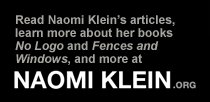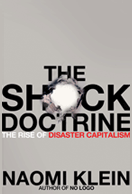The Shock Doctrine

New Books By Alan Greenspan and Naomi Klein: One is Prophetic, One is Pathetic
Arianna Huffington, Huffington Post, September 25, 2007
A fascinating dispute on modern economics -- and the dominant role it plays in our politics - is currently taking place in America's bookstores.
On one side is Alan Greenspan, whose The Age of Turbulence: Adventures in a New World offers his usual free market uber alles philosophy, while attempting to rehabilitate his tattered image (which is worth about as much as the U.S. dollar these days).
On the other side is Naomi Klein, whose The Shock Doctrine: The Rise of Disaster Capitalism offers an alternative economic history of the last 30 years and, using the war in Iraq as a mind-blowing example, pulls the curtain back on free market myths and exposes the forces that are really driving our economy.
Klein's book is powerful and prophetic. Greenspan's is pitiful and pathetic.
Yet it is Greenspan's 500-page memoir that been getting all the attention, as almost no traditional media outlet has been able to resist what Josh Marshall has aptly dubbed "The Greenspan Embarrassment Tour."
Greenspan's book is another in the growing pile penned by folks who lent their integrity to buttress the Bush presidency but who now, in horrified hindsight, want it back.
Now that it's clear what an unsound strategy investing in George Bush turned out to be, Greenspan wants us to know he was skeptical all along. Imagine his shock when he found out that in the Bush White House the "political operation was far more dominant" and that "little value was placed on rigorous economic policy debate or the weighing of long-term consequences." Yes, who could have imagined that sort of thing happening in a White House run by Karl Rove?
Nor did the former Fed Chair mean for his pro-tax cut testimony in 2001 to be seen as, well, pro-tax cuts. It turns out he was just really concerned about the federal deficit drying up, and thought that, surely, Bush would institute triggers should the tax cuts cause the budget to go into deficit.
When that didn't happen, Greenspan says he was disappointed, but, then, what could he really do? He knew the policies were bad, but he was just the Chairman of the Fed. Who would ever pay attention to lil ol' Alan Greenspan?
He also wants us to know that he advised Bush against the GOP's "out-of-control" spending and that he thinks the Republicans "deserved to lose." Well, thanks, but that and two bucks will get you a British pound.
Greenspan's "I was against it, even when I acted like I was for it" attempt at the irrational exhumation of his reputation is laughable but hasn't stopped the book from getting massive attention.
Meanwhile, the book that should be in the spotlight is The Shock Doctrine.
It's a brilliant dissection of what Naomi Klein calls "disaster capitalism," an economic philosophy born half a century ago at the University of Chicago under Milton Friedman. It holds that the best time to institute radical free-market policies is in the aftermath of a massive social crisis, such as a terrorist attack, a war, or a natural disaster like Katrina.
Klein shows how the crony capitalists running the Bush administration saw post-invasion Iraq as the perfect proving ground for all their pet free-market policies. The fantasy was that a privitazied and corporatized Iraq would become a free-market utopia that would spread the gospel of the market throughout the Middle East. Democracy would reign, and Halliburton and Bechtel would stand supreme.
And we know how well that turned out.
Klein's writing on the subject helped inspire John Cusack to create a stinging new satiric film called War, Inc. The pair recently sat down for a lively and insightful conversation on The Shock Doctrine, Iraq, the burgeoning new economy that has sprung up around the war on terror, and Baghdad's Green Zone, which Klein calls "a heavily armed Carnival Cruise ship parked in a sea of despair." To watch the video of this conversation click here.
And to read a transcript of Klein giving Greenspan all he can handle -- and then some -- on Democracy Now, click here. (Of special note is Klein taking hold of Greenspan's headline-grabbing claim that the war in Iraq was about making sure the flow of the world's oil wasn't interrupted, and asking, "Are you aware that, according to the Hague Regulations and the Geneva Conventions, it is illegal for one country to invade another over its natural resources?")
Greenspan is a lifelong devotee of Ayn Rand, whose books The Virtue of Selfishness and Atlas Shrugged are the bibles of free-marketeers. I actually loved them myself. When I was 11. I grew out of them, but Greenspan never did. And, as any self-respecting fan of Rand knows, the guiding principle of her work is rational self-interest. The problem is, what's in the self-interest of the CEO of Halliburton is most likely not in the self-interest of your average American. In any case, Greenspan may not have always followed the "rational" part, but he's clearly nailed the "self-interest" part. It was in his narrow self-interest to cheerlead for Bush in 2001, so he did it. Now the country -- and most of the world -- has turned on Bush, and Greenspan sees it is in his self-interest to distance himself from Bush. His mentor would be proud.
A fascinating dispute on modern economics -- and the dominant role it plays in our politics - is currently taking place in America's bookstores.
On one side is Alan Greenspan, whose The Age of Turbulence: Adventures in a New World offers his usual free market uber alles philosophy, while attempting to rehabilitate his tattered image (which is worth about as much as the U.S. dollar these days).
On the other side is Naomi Klein, whose The Shock Doctrine: The Rise of Disaster Capitalism offers an alternative economic history of the last 30 years and, using the war in Iraq as a mind-blowing example, pulls the curtain back on free market myths and exposes the forces that are really driving our economy.
Klein's book is powerful and prophetic. Greenspan's is pitiful and pathetic.
Yet it is Greenspan's 500-page memoir that been getting all the attention, as almost no traditional media outlet has been able to resist what Josh Marshall has aptly dubbed "The Greenspan Embarrassment Tour."
Greenspan's book is another in the growing pile penned by folks who lent their integrity to buttress the Bush presidency but who now, in horrified hindsight, want it back.
Now that it's clear what an unsound strategy investing in George Bush turned out to be, Greenspan wants us to know he was skeptical all along. Imagine his shock when he found out that in the Bush White House the "political operation was far more dominant" and that "little value was placed on rigorous economic policy debate or the weighing of long-term consequences." Yes, who could have imagined that sort of thing happening in a White House run by Karl Rove?
Nor did the former Fed Chair mean for his pro-tax cut testimony in 2001 to be seen as, well, pro-tax cuts. It turns out he was just really concerned about the federal deficit drying up, and thought that, surely, Bush would institute triggers should the tax cuts cause the budget to go into deficit.
When that didn't happen, Greenspan says he was disappointed, but, then, what could he really do? He knew the policies were bad, but he was just the Chairman of the Fed. Who would ever pay attention to lil ol' Alan Greenspan?
He also wants us to know that he advised Bush against the GOP's "out-of-control" spending and that he thinks the Republicans "deserved to lose." Well, thanks, but that and two bucks will get you a British pound.
Greenspan's "I was against it, even when I acted like I was for it" attempt at the irrational exhumation of his reputation is laughable but hasn't stopped the book from getting massive attention.
Meanwhile, the book that should be in the spotlight is The Shock Doctrine.
It's a brilliant dissection of what Naomi Klein calls "disaster capitalism," an economic philosophy born half a century ago at the University of Chicago under Milton Friedman. It holds that the best time to institute radical free-market policies is in the aftermath of a massive social crisis, such as a terrorist attack, a war, or a natural disaster like Katrina.
Klein shows how the crony capitalists running the Bush administration saw post-invasion Iraq as the perfect proving ground for all their pet free-market policies. The fantasy was that a privitazied and corporatized Iraq would become a free-market utopia that would spread the gospel of the market throughout the Middle East. Democracy would reign, and Halliburton and Bechtel would stand supreme.
And we know how well that turned out.
Klein's writing on the subject helped inspire John Cusack to create a stinging new satiric film called War, Inc. The pair recently sat down for a lively and insightful conversation on The Shock Doctrine, Iraq, the burgeoning new economy that has sprung up around the war on terror, and Baghdad's Green Zone, which Klein calls "a heavily armed Carnival Cruise ship parked in a sea of despair." To watch the video of this conversation click here.
And to read a transcript of Klein giving Greenspan all he can handle -- and then some -- on Democracy Now, click here. (Of special note is Klein taking hold of Greenspan's headline-grabbing claim that the war in Iraq was about making sure the flow of the world's oil wasn't interrupted, and asking, "Are you aware that, according to the Hague Regulations and the Geneva Conventions, it is illegal for one country to invade another over its natural resources?")
Greenspan is a lifelong devotee of Ayn Rand, whose books The Virtue of Selfishness and Atlas Shrugged are the bibles of free-marketeers. I actually loved them myself. When I was 11. I grew out of them, but Greenspan never did. And, as any self-respecting fan of Rand knows, the guiding principle of her work is rational self-interest. The problem is, what's in the self-interest of the CEO of Halliburton is most likely not in the self-interest of your average American. In any case, Greenspan may not have always followed the "rational" part, but he's clearly nailed the "self-interest" part. It was in his narrow self-interest to cheerlead for Bush in 2001, so he did it. Now the country -- and most of the world -- has turned on Bush, and Greenspan sees it is in his self-interest to distance himself from Bush. His mentor would be proud.






















